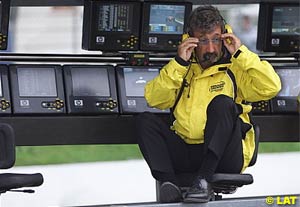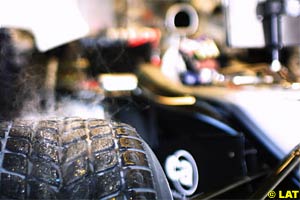
This week's Grapevine brings you |
It's not exactly a closely guarded secret that Formula One budgets are being constricted this year, but nothing brings the point home quite as clearly as when teams take turns laying off a significant portion of their work force.
Eddie Jordan knows better than to try and spin the cuts much away from the basic underlying reason -- removing close to a million pounds from the personnel budget. Saying the team is taking an opportunity to restructure, heading back to their 'lean and mean' and 'flexible' heyday is a nice redirection, though. After all, this many cuts would have been a problem without restructuring!
On the positive side, restructuring was overdue. The growth of recent years had not been accomplished with a similar growth in inter - and intra- department communications, resulting in a less than optimally efficient structure. The restructuring is expecting to improve the way departments work together, promoting better information flow. New ideas and concepts, as well as requirements, will be distributed faster and further, offering improved feedback and quick responses.
Initial results of the restructuring should be felt in the second half of the year, offering the promise of seeing car development accelerate. On the downside, the off-season is going to be tougher: parallel work on the new car is not going to bring it along any faster than last season, and there will be fewer bodies for the mad rush to turn out new chassis in the same time scale.
Looking further abroad, it's no accident that Dave Richards has sliced so deeply into the BAR architecture, incidentally to excising the old guard; likewise, it is no secret that Niki Lauda would like to do something similar at Jaguar (and is quietly working at it, too). Nor is Paul Stoddart too happy about running both English and Italian arms of the team at Minardi, as the overheads are awkward, to say the least.
Performance is key in Formula One, and never more for team members than when the budget is tight, and the results aren't coming.
Following Ferrari's emphatic win in San Marino, there's been some serious head-scratching going on at Michelin.
The game plan for the event was simple. Williams should have had the legs on the field: the combination of Michelin's rubber and BMW power should have had an advantage over Ferrari. Further down the field, McLaren were always on for the tail end of the points, whilst close work with Renault should have put them decisively ahead of Sauber in the running. Simple!
However, it turned out that Ferrari were never going to quite fall into the planned niche. The warning signs were there in Brazil, when Ferrari looked comfortable winning on a one-stop strategy, despite predictions that Bridgestone runners would need two stops to remain competitive. However, the powers that be believed Montoya's early clash cost him a probable win, and with Ralf Schumacher clearly being held up by his brother by the end of the race, obviously, Michelin rubber held the overall advantage.
Except that the Imola result clearly demonstrated otherwise. In the post mortem, there are a couple of things that came to light. Of some concern, Michelin-driven advice adversely affected the race plans of two front runners: David Coulthard and Juan Pablo Montoya both took engineers advice (to counter a predicted performance characteristic, and wearing the tyre out, respectively) that resulted in race long understeer. More importantly for the season, however, Michelin have been compelled to completely revise their estimate of the Ferrari-Bridgestone relationship. There is a level of synergy between the F2002 and its tyres that just was not demonstrated by its predecessor or in other words, the F2001 ran well on Bridgestone tyres, but the F2002 really leverages them to bring harmony to the package.
Whilst it was obvious from the end of last season that Bridgestone would work closest with Ferrari in their search for success, Michelin's season of prioritising Williams' requirements just didn't prepare them for the way Ferrari's new car works with its tyres. The net result is a big wake up call to Michelin, who now realise the size of the mountain they suddenly have to climb, if they want to be competitive over the remainder of the season.
In the week immediately following the San Marino Grand Prix, the Michelin approach to 2002 has been rethought, and there are going to be some changes implemented, effective immediately.
Until now, there has been a compromise approach taken to developing tyres. Williams are the lead team and their requirements have been a priority; however, the speed of implementation of changes have been tempered to allow the remaining teams to adjust, or provisional rubber has been rejected because it would be detrimental to the other Michelin runners. Similarly, whilst the 'prime' tyres at each event have been selected with Williams requirements in mind, the 'option' rubber has looked to offer something to Renault or McLaren. Michelin's original 2002 plan was to have as many potential points scoring finishes as possible, which is why Renault has been receiving some good attention: getting them ahead of Sauber for "best of the rest" status is key to ensuring that front runners dropping out only puts another Michelin team into the points paying positions.
However, finishing third through sixth is not good enough: Michelin need to be seen as challenging for wins, even if the top step of the podium proves elusive. So until someone else proves themselves up to the task of winning races, Williams' requirements are going to be given top priority. That extends to complete control of the direction the tyres are developed in, and selection of both option and prime tyres for race weekends.
On a similar vein, the development process is being revised. The incorrect advice offered to Coulthard and Montoya in Imola was a direct consequence of putting so much effort into testing new constructions and compounds for absolute pace, on balanced cars, without spending time working out the characteristics of the tyres over long distances. More effort is to go into establishing an understanding of the tyre characteristics under imperfect conditions.
Lastly, with some reluctance, Michelin are conceding Bridgestone's current lead on wet tyres in order to free up more effort for dry work. The wet development programme is to continue, but with a significantly reduced emphasis: over the course of the season, it is anticipated that Williams and McLaren will be at a disadvantage to Ferrari, but still hold an advantage over Sauber. The investment required to improve Michelin's return in points is simply prohibitive.
![]() Budget, or Performance?
Budget, or Performance? The industry is known for its burn-out nature, demanding quality results from talented individuals, before 'moving them on' when the hours take their toll. Occasionally, particularly when expanding quickly, some 'dead wood' can creep in; but it is rare for those people to be around for long. This is a tough sector.
The industry is known for its burn-out nature, demanding quality results from talented individuals, before 'moving them on' when the hours take their toll. Occasionally, particularly when expanding quickly, some 'dead wood' can creep in; but it is rare for those people to be around for long. This is a tough sector.
![]() Michelin Shaken but Stirring
Michelin Shaken but Stirring
 Looking at the relative performances of the teams along the pitlane, almost every team performed pretty much as the French tyre manufacturer predicted for the event. The rubber they had supplied their teams brought almost exactly the responses anticipated. More to the point, the Bridgestone runners almost all performed to the copy text. Except, of course, Ferrari.
Looking at the relative performances of the teams along the pitlane, almost every team performed pretty much as the French tyre manufacturer predicted for the event. The rubber they had supplied their teams brought almost exactly the responses anticipated. More to the point, the Bridgestone runners almost all performed to the copy text. Except, of course, Ferrari.
Please Contact Us for permission to republish this or any other material from Atlas F1.
|
Volume 8, Issue 17
Atlas F1 Exclusive
Interview with Takuma Sato
Jo Ramirez: a Racing Man
Articles
Fisichella's Recurring Nightmare
Spanish GP Preview
Spanish GP Preview
Local History: Spanish GP
Facts, Stats & Memoirs
Columns
The Spanish GP Quiz
Bookworm Critique
Elsewhere in Racing
The Grapevine
> Homepage |
